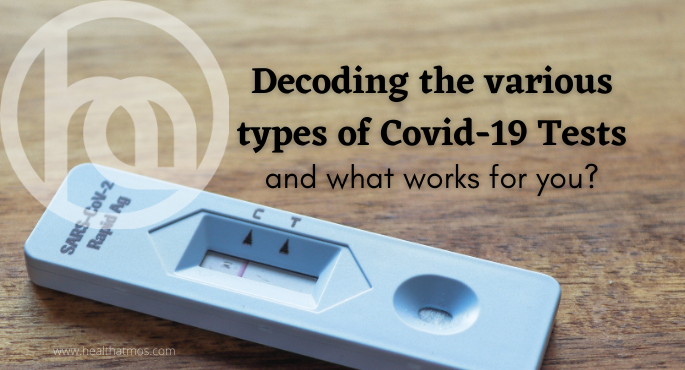Decoding the Various Types of COVID-19 Tests

Types of Covid-19 Tests:
There are different requirements for Covid-19 tests based on what purpose it serves, whether medical, travel or self. Each test is performed differently and needs a different time for results. This article is not about explaining the scientific details of these tests, but to help you understand the main types of Covid-19 tests and which one you should go for depending on your purpose.
There are three types of COVID-19 tests but two types of tests are broadly used:
- Molecular tests. (Also known as nucleic acid, RNA or PCR tests)
- Rapid antigen tests (RAT). (Also known as rapid antigen detection test (RADT), antigen rapid test (ART)).
- The third type of serology testing helps to identify if you had the virus in the past by looking for antibodies in the blood that our immunity generates to fight the virus.
PCR Tests:
What is it?
PCR tests are Molecular COVID-19 tests performed by testing a swab of a specimen taken from the patient’s nose and throat. It detects the RNA (or nucleic acid) component of the virus.
How does it work?
You can take a PCR test at a drive-through centre or your home. The swab can be taken from your nose and/or your throat. It is sent to a laboratory where a lab technician looks for the genetic material of the virus using highly specialized equipment. Results are given by text or a phone call in 24-48 hours or up to five working days when the demand is high.
Additional Information
Some Molecular tests are the Reverse Transcription Polymerase Chain Reaction (RT-PCR) Test, Nucleic Acid Amplification Test (NAAT) and Reverse Transcription Loop-Mediated Isothermal Amplification (RT-LAMP) Test. These tests are considered more accurate than antigen tests.
PCR tests are the most common COVID-19 tests, approved for travel requirements by airlines and international governments. PCR tests are the “gold standard” test for identifying clinical cases of infection because it requires laboratory analysis.
So, if you are travelling, this is the test required as a part of most travel guidelines as your pre-departure test. Please check the updated destination country guidelines before you book your test.
Costs
A PCR test typically costs anywhere between $75 to $100 approx
Source – Types of COVID Tests: Procedure, Accuracy, Results & Cost (healthline.com)
Antigen Tests:
What is it?
Antigen tests help in identifying whether you have the virus at the time when you take the test. It helps detect the virus in patients who are still highly infectious, and who should be isolated or quarantined.
How does it work?
You or a medical professional will insert a cotton swab into your nose, throat, or both to collect mucus and cells. Your sample is then usually applied to a strip that changes colour if you test positive for COVID-19. These tests look for proteins on the surface of the virus which can be easily found in saliva or the nose. These tests do not need to be sent to a lab for results and can give results in as little as 15 minutes.
Additional information
Antigen tests are not as specific as molecular tests and are less accurate than molecular tests. They are more likely to give false negative results especially when someone gets tested a week or longer after the symptoms start. In such a case, the amount of antigen is typically low and goes undetected even though the patient has COVID-19.
Costs
The cost of an Antigen test is between approx $5 to $50.
Lateral Flow Test
What is it?
Lateral flow tests are also called the Rapid Tests since they are the faster version of Molecular Tests. Lateral flow tests detect active coronavirus infections from a swap from the nose, with results in minutes, as no laboratory testing is needed. So you know instantly whether you’ve got the virus. LFT can provide results within 30 minutes however not as accurate as PCR Tests.
How does it work?
It works similarly to the pregnancy strip. A positive result is identified by the dark band or a fluorescent glow on the test strip, with a result in about 30 minutes.
To elaborate, LFTs pick up active Covid-19 infection with a nasopharyngeal swab sample placed on a small absorbent pad, which is then drawn along the Testing pad via a capillary line to a strip coated in antibodies, which bind to SARS-Cov-2 proteins. If these proteins are present, this will show as a coloured line on the test, indicating infection. These have been more often used by asymptomatic people.
Additional Information
LFTs detect positive cases when viral loads are the highest and patients are most infectious, typically one to three days before the onset of symptoms and during the first five to seven days after the onset of symptoms. LFTs are less effective at detecting the virus in non-symptomatic people. That is the reason experts warn the lateral flow tests “are inappropriate for use as a tool because they are not accurate enough. They’re commonly being used for rapid testing in communities, schools and workplaces.
Costs
A Lateral flow test typically costs anywhere between $49 and $79 approx
Antibody Tests
What is it?
An antibody test also known as a serology test identifies whether a person has had a past infection. Antibodies are proteins created by the immune system and help to fight off infections. They are made 1 to 3 weeks after you have been infected or have been vaccinated against infection. These tests should not be used to diagnose a current infection.
How does it work?
Antibody Tests is blood test to look for antibodies. A phlebotomist or lab technician will take your blood sample through a vein in your forearm. The blood is sent to a lab where the blood is centrifuged and serum is tested for antibodies. In some countries, you get an Antibody kit, where you need to prick your fingertip using a device called a lancet and squeeze some blood in a tube and send it back to a lab for testing.
Additional Information
Our body makes antibodies when we get an infection. They help fight the infection. So, if you have COVID-19 antibodies in your blood, then it is likely that you’ve had the virus before or had the COVID-19 vaccine. But if you are tested soon after being infected with SARS-CoV-2, the test may be negative, because it takes time for the body to develop an antibody response. It is also unknown if antibody levels decline over time to undetectable levels.
Costs
The cost of an antibody test is between $30 and $50 approx.
Home testing for COVID-19
COVID-19 home testing options are now being available, including molecular, antigen, and antibody tests. However, they primarily are home collection or At-home tests.
What is it?
Home collections tests are where the samples are sent to a Lab for testing and reports are sent to you. At-home tests are performed with a kit with an instruction sheet so that you can perform it yourself at home.
How does it work?
You can choose from Molecular or Antibody tests.
In-Home viral tests you need to provide a nasal swab or saliva sample. In a Home antibody test, you are asked to provide a blood sample from a fingerstick.
Now that you are clear on the different types of Covid-19 tests, you can book one as per your specific requirement or purpose.
Book your test
You can book your Covid-19 Test here. If you want to book the test for a group then you can email your requirement to support@healthatmos.com Thank you for reading this article. Hope you found it helpful. Stay Safe. Stay healthy!
